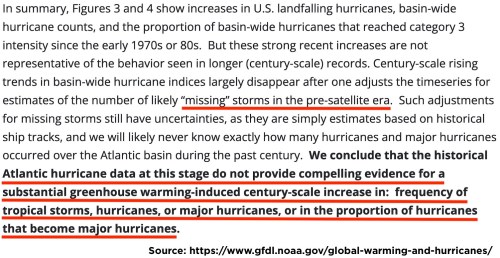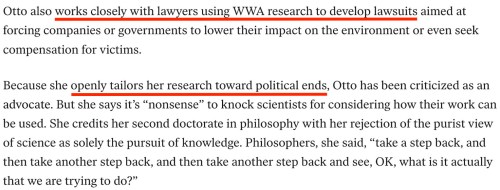 The media are using Hurricane Idalia to spread the false narrative that fossil fuels make extreme weather danger worse.
The media are using Hurricane Idalia to spread the false narrative that fossil fuels make extreme weather danger worse.
In reality, fossil fuels make us safer from extreme weather.
Here are answers to the media’s top 25 extreme weather myths.
Myth 1: The world is experiencing unprecedented danger from extreme weather thanks to fossil fuels.
Truth: The world is experiencing unprecedented safety from extreme weather thanks to FFs—because FFs’ climate mastery benefits overwhelm any negative climate side-effects. 2
Myth 2: The media and its designated experts are accurately reporting on fossil fuels and extreme weather.
Truth: The media and its “experts” are:
1. totally ignoring how fossil fuels make us safer than ever from extreme weather
2. wildly overstating fossil fuels’ negative impact on weather.
Myth 3: The effect of fossil fuels on extreme weather danger is solely negative.
Truth: Not only can warming from fossil fuels have significant benefits (fewer cold deaths) but the low-cost energy fossil fuels provide for billions gives us an unprecedented ability to master extreme weather.
Fossil fuels have made us far safer from extreme weather by providing low-cost energy for the amazing machines that protect us against storms, protect us against extreme temperatures, and alleviate drought. Deaths from extreme weather have decreased by 98% over the last century! 3
Myth 4: We don’t need fossil fuels to protect ourselves from extreme weather—we can just use alternatives.
Truth: As Europe is illustrating, there is no near-term replacement for fossil fuels for the 1/4 of the world that uses abundant energy—let alone the 3/4 of the world that doesn’t. 4
Fossil fuels will for decades remain uniquely able to provide low-cost, reliable energy to billions. That’s why fossil fuels are 80% of world energy and still growing.
Restricting fossil fuel use means far less energy for climate-mastery activities such as heating, cooling, and irrigation. 5
Myth 5: The media and its designated experts are accurately reporting the scientific link between fossil fuel use and hurricanes.
Truth: This “reporting” is riddled with:
1. deliberate misrepresentations (e.g., hurricane frequency)
2. biases (e.g., only reporting negative links)
Myth 6: Media claims about increasing hurricane frequency are accurate.
Truth: Leading media outlets have deliberately misrepresented the flat long-term hurricane trend. For the New York Times, cherry-picking a starting point—the low point of 1980—to make a flat trend seem upward. 6
Leading media outlets have also deliberately ignored statements by the National Oceanographic and Atmospheric Administration (NOAA) and the Intergovernmental Panel on Climate Change (IPCC) about how any increases in hurricane frequency in records are likely due to increasing reporting, not actual frequency. 7
Here are the latest data on global hurricane frequency and intensity from a 2022 paper (Klotzbach et al). Does this remotely resemble what trusted media sources tell you? 8
Here’s recent US data for landfalling hurricanes, both overall and major. Again, consuming the New York Times and other trusted sources would you have any idea that the data looked like this? 9
Myth 7: Hurricanes are expected to get more frequent as temperatures rise.
Truth: Mainstream science expects that hurricanes will become less frequent as temperatures rise. 10
Myth 8: Hurricane intensity is expected to get catastrophically higher as temperatures rise.
Truth: Mainstream estimates say hurricanes will be less frequent and between 1-10% more intense. This is not at all catastrophic if we continue our fossil-fueled climate mastery. 11
Myth 9: Media-cited research on extreme weather is unbiased.
Truth: Extreme weather research is riddled with biases. In addition to ignoring fossil-fueled climate mastery, many researchers have overtly political motives and ignore the positive impacts of fossil fuels on weather.
Myth 10: Climate researchers have no political bias.
Truth: Certain climate-attribution “scientists” admit that they are motivated by political goals and shape their “science” accordingly, e.g., media favorite Friederike Otto wants climate research “on the offensive.” 12
Myth 11: Extreme weather “attribution” researchers are simply trying to understand extreme weather and have found fossil fuels guilty.
Truth: Extreme weather “attribution” only looks for the negative impacts of fossil fuels on extreme weather, brazenly ignoring any avoided negative impacts.
One of the few climate researchers who is openly looking at the full impact of fossil-fueled climate change, including potential avoided damage, is meteorologist and hurricane expert Dr. Ryan Maue. What are the chances we see his point about avoiding hurricanes in the mainstream news?
Hurricane Dorian 3-years ago stalled just off the Florida coast in Bahamas & tracked north, paralleling the coast.
New analysis of the event strongly suggests that climate change stopped Dorian's advance. Researchers have directly linked slowing of hurricanes to climate change.
— Ryan Maue (@RyanMaue) August 31, 2022
Myth 12: Attributions of X% of an extreme weather event to humans are credible.
Truth: Not only are many attributioners clearly biased, but no precise estimate of this kind is possible given today’s climate modeling limits, where mainstream models hugely diverge from one another. 13
Myth 13: Fossil fuels made Hurricane Idalia worse for Florida.
Truth: While we can’t know exactly how Idalia was different because of human climate impacts, we know that without fossil fuels, Florida would be a third-world place and Idalia would have been utterly devastating.
We also don’t know how many hurricanes the US East Coast and other vulnerable spots dodged or will avoid thanks to global warming.
Models cannot give us this information and since it’s not a negative, no mainstream and public researcher in the field is looking for ways to find out.
Myth 14: Thanks to fossil fuels more people are dying from extreme weather.
Truth: Thanks to fossil fuels more people are not dying from extreme weather—and everything else. Fossil-fueled prosperity has driven climate disaster deaths down 98% and life expectancy up by decades. 14
Myth 15: Thanks to fossil fuels we are suffering overwhelming damage from extreme weather.
Truth: The trend of real weather damage is flat—despite many factors increasing vulnerability, like increasing coastal populations and bad incentives from government bailout policies. 15
Read rest at Energy Talking Points































The author seems to have bought into the concept that there are negative impacts to using fossil fuels. “because FFs’ climate mastery benefits overwhelm any negative climate side-effects.” If the exhaust isn’t filtered as is the case in China, there are negative effects. However, carbon dioxide from using fossil fuels can not have “negative climate side-effects.” This gas is beyond its saturation point as far as its ability to cause warming. We need to remember that the first scientific assessment report of the IPCC found no link between CO2 and warming. Of course, the politicians made sure that never happened again.
Baack in 2005 the blamed Hurricane Katrina on Global Warming/Climate Change the same with Hurricanes Sandy, Harvey and Irma they just use all these Hurricanes as a excuse to bring about a New World Order and a One World Government all under the United(Soviet)Nations